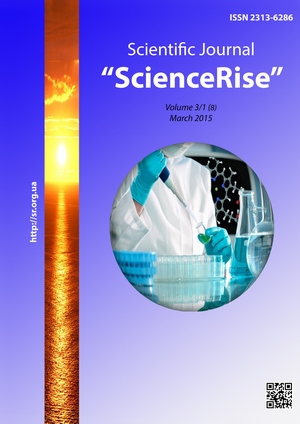Gender differentiation in the lexicon of the serbian language
DOI:
https://doi.org/10.15587/2313-8416.2015.39228Keywords:
gender, gender stereotype, lexeme, linguistic picture of the world, feminine, masculineAbstract
The article focuses its attention on the concepts "gender", "gender stereotype" and linguistic picture of the world. The lexicon of the Serbian language was researched through the prism of the analysis of synonymic rows which are used to represent character traits of men and women. In the structure of these concepts the following terms were pointed out: external characteristics, physical characteristics, internal characteristics, intellectual characteristics. Within the framework of the microcomponent “internal characteristics” two different negative features of both genders were analyzed: indecisive man, rude man; talkative woman, angry woman.
References
Zubov, M. I. (2004). Linhvotekstolohiia serednovichnykh slovianskykh povchan proty yazychnytstva: Monohrafiia [Linguotextology of the medieval Slavic homilies against paganism]. Odessa: ORIDU NADU, 336.
Tolstoy, I. I. (1957). Serbsko-horvatsko-russkyi slovar [Serbo-Croatian-Russian dictionary]. Moscow: State Publishing House of Foreign and National Dictionaries, 1168.
Tshositsh, P. et. al. (2008). Rechnik sinonima [Thesaurus]. Belgrade: Cone, 712.
Serbian slang dictionary. Available at: http://vukajlija.com/
Dictionary Serbian jargon. Available at: http://opusteno.rs/ljubav-romantika-f4/recniku-srpskog-zargona-t1758.html
Bessonova, O. L. (2002). Otsinnyi tezaurus angliyskoi movy: kognityvnyi i gendernyi aspekty [Evaluation Thesaurus of English Language: Cognitive and Gender Aspects]. Donetsk, 463.
Kirilina, A. V. (2000). Gendernye aspekty yazyka i kommunikatsii [Gender aspects of language and communication]. Moscow, 369.
Martyniuk, A. P. (2004). Konstruyuvannia gendera v anglomovnomu dyskursi [Gender Construction in the English Discourse]. Kharkiv: Konstanta, 292.
Sokolova, N. V. (2007). Verbalizatsiia kontseptosfery "fenizm" v amerykanskomu zhinochomu dyskursi XIX–XXI st. [Verbalization of conceptual domain of “feminism” in American women’s discourse of XIX-XXI c]. Odessa, 253.
Sukalenko, T. M. (2010). Metaforychne vyrazhennia kontseptu zhinka v ukrainskii movi [Metaphoric expression of the concept “Zhinka” (Woman) in the Ukrainian language]. Kyiv: Publishing House “Dmytro Buraho”, Institute for the Ukrainian Language, 240.
Gender peculiarities of the author’s speech. Available at: http://knowledge.allbest.ru/languages/3c0b65635a3bc78b5c43a89521306d27_0.html
Smit, S. (1997). Postmodernizm i sotsialnaia istoriia na zapade: problemy i perspektivy [Postmodernism and social history in the west: problems and perspectives]. Questions of History, 8, 154–161.
Maslova, V. A. (2004). Homo lingualis v kulture: monografia [Homo lingualis in culture]. Vitebsk: Vitebsk State University named after P. M. Masherov, 214.
Dmytriieva, M. M. Is an honest woman an honest person? Available at: http://linguistics.kava.kiev.ua/publications/2006/06/30/chi e chesna zhinka 58.html
Selivanova, O. O. (1999). Aktualni napriamy suchasnoi linhvistyky (analitychnyi ohliad) [Actual directions of the modern linguistics (analytical overview)]. The manual for the students of Ukrainian language and literature departments. Kyiv: Phytosociocentre, 148.
Actual problems of the modern Ukrainian gender linguistics. Available at: http://www.ukrreferat.com/index.php?referat=69143&pg=1
Levchenko, O. P. (2003). Linhvokulturolohiia ta yii terminna systema [Linguoculturology and its term system]. Problems of the Ukrainian terminology, 490, 105–113.
Downloads
Published
Issue
Section
License
Copyright (c) 2015 Дарія Володимирівна Девлиш

This work is licensed under a Creative Commons Attribution 4.0 International License.
Our journal abides by the Creative Commons CC BY copyright rights and permissions for open access journals.
Authors, who are published in this journal, agree to the following conditions:
1. The authors reserve the right to authorship of the work and pass the first publication right of this work to the journal under the terms of a Creative Commons CC BY, which allows others to freely distribute the published research with the obligatory reference to the authors of the original work and the first publication of the work in this journal.
2. The authors have the right to conclude separate supplement agreements that relate to non-exclusive work distribution in the form in which it has been published by the journal (for example, to upload the work to the online storage of the journal or publish it as part of a monograph), provided that the reference to the first publication of the work in this journal is included.

